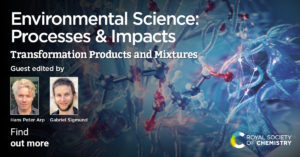We are pleased to announce the launch of a new themed collection in Environmental Science: Processes & Impacts (ESPI) on the topic of Transformation Products and Mixtures.
The identity and impact of many substances on the global market are not fully known because they are complex mixtures or can lead to potentially harmful transformation products. Though it is an expectation by regulators that the health and environmental impacts of chemical mixtures and transformation products are implicitly accounted for, this is very rarely done. High profile examples of harmful mixtures include chlorinated paraffins, alkyl-phenol ethoxylates. Of particular concern are so-called UVCBs (‘unknown or variable composition, complex reaction products or biological materials’) and polymer mixtures.
Recent high-profile examples of problematic transformation products include fire stabilizer 6PPD transforming to 6PPD quinone, which has been associated with acute fish toxicity, and several substances that form the rapidly accumulating human and environmental concentrations of trifluoracetic acid (TFA), a highly persistent, mobile and potentially toxic chemical. Innovative and prospective experimental and computational approaches to identifying unknown mixtures and transformation products that are potentially causing harm are urgently needed.
To address these challenges new experimental, analytical, modelling and cheminformatic tools are being developed that can help better identify the identity and impact of transformation products and mixtures, which will pave the way towards effective hazard and risk management. The challenge of addressing mixtures and transformation products represents in this a key frontier of environmental chemistry, chemical regulation and innovation.
Topics that may be included in this collection include, but are not necessarily limited to:
• Mixtures and/or transformation products in the environment
• New analytical Methods
• Computational Methods
• Predictive Approaches
• Screening Tools
• Health & Environmental Impact Studies
• Effect Directed Analysis
• Monitoring Studies
• Cheminformatics
• Policy Analysis
• Regulatory Strategies
The collection will be supported by Guest Editors Hans Peter Arp (Norwegian Geotechnical Institute, Norwegian University of Science and Technology) and Gabriel Sigmund (Wageningen University & Research). We look forward to your contributions to this themed collection, which will highlight the latest advancements and foster continued innovation in the field of environmental sciences. The submission deadline is 30th September 2025.
If you’re interested, we invite you to submit your research today on our submissions platform, quoting ‘EMTrans25’ in the ‘Comments to the Editor’ when submitting your manuscript. You can get in touch with the editorial office with any questions you may have about this collection.












